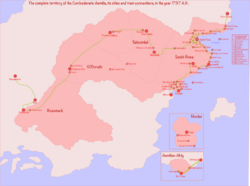Confoederatio Aemilia: Difference between revisions
mNo edit summary |
mNo edit summary |
||
| (One intermediate revision by the same user not shown) | |||
| Line 45: | Line 45: | ||
}} | }} | ||
The '''Confoederatio Aemilia''' ([[Problematic]], [[Istvanistani language|Istvanistani]] translation: ''Aemilian Confederation'') | The '''Confoederatio Aemilia''' ([[Problematic]], [[Istvanistani language|Istvanistani]] translation: ''Aemilian Confederation'') was an association of small states that share a single head of state, Princess [[Emilia Antoinette]]. As of 1727, the association included [[Stadt Taktwinkel]], [[Stadt Sankt Rosa]] and [[Murder]]. The Confoederatio Aemilia was a successor state to the [[Taktwinkel|City and Countryside of Taktwinkel]], which was unable to establish an effective form of government outside Stadt Taktwinkel, and which saw the almost equally large Stadt Sankt Rosa demand an equal or greater position. The Confoederatio Aemilia was geographically divided among the southeast of Cibola, the south of Apollonia and an island south of Corum. | ||
The Confoederatio Aemilia | In 1739, the Confoederatio Aemilia was succeeded by the [[Aemilian Federation]], following an act of the [[Aemilian Senate]]. | ||
The Confoederatio Aemilia was divided into several jurisdictiones (Problematic, Istvanistani translation: ''jurisdictions''), these are: | |||
* [[Taktwinkel]], since 1723, on Cibola | * [[Taktwinkel]], since 1723, on Cibola | ||
* [[Murder]], since 1723, south of Corum | * [[Murder]], since 1723, south of Corum | ||
| Line 55: | Line 57: | ||
* [[Rossmark]], since 1733, on Cibola | * [[Rossmark]], since 1733, on Cibola | ||
The Confoederatio Aemilia | The Confoederatio Aemilia was a liberal democratic principality, and while the association is formally comprised of states that have a right to their own sovereignty, they all shared the same laws. As part of the articles of association, the states abided by all legislation passed by the [[Aemilian Senate]] making the association function as a unitary state in practice. | ||
While part of [[PRIMA]], a cooperation effort with the [[United Kingdom of Meckelnburgh]], the nation maintained a policy of neutrality. The cooperation with Meckelnburgh was focused on working together on production and intelligence, so that both nations can better defend themselves, not to pursue a further common agenda. | |||
Latest revision as of 20:06, 29 December 2024
| Confoederatio Aemilia | |||
| |||
| Motto: Senatus et populus, fidelissimae reginae Senate and people, loyal to the princess | |||
| Anthem: Princess of Pink | |||

| |||
| Map versions | 17.8.7 onwards | ||
| Capital | Taktwinkel | ||
| Largest city | Sankt Rosa | ||
| Official language(s) | Problematic, South Cibolan Saxon | ||
| Official religion(s) | South Cibolan Witchcraft | ||
| Demonym | Aemilian(s) | ||
| - Adjective | Aemilian | ||
| Government | Liberal-democratic Principality | ||
| - Princess | Emilia Antoinette | ||
| - Chancellor | Charlène Jolicoeur-Schafenweide | ||
| - Legislature | Aemilian Senate | ||
| Establishment | XIII.1722 AN | ||
| Area | |||
| Population | 12,734,021 (1723 census) | ||
| Currency | various | ||
| Calendar | Norton Calendar | ||
| Time zone(s) | CMT-9 | ||
| Mains electricity | |||
| Driving side | right | ||
| Track gauge | 1,435 millimeters | ||
| National website | staat.cae | ||
| National forum | staat.cae/forum | ||
| National animal | Pink spotted nutcracker | ||
| National food | Crackers with cucumber slices | ||
| National drink | Sparkly rosé | ||
| National tree | Cherry blossom | ||
| Abbreviation | AEM | ||
The Confoederatio Aemilia (Problematic, Istvanistani translation: Aemilian Confederation) was an association of small states that share a single head of state, Princess Emilia Antoinette. As of 1727, the association included Stadt Taktwinkel, Stadt Sankt Rosa and Murder. The Confoederatio Aemilia was a successor state to the City and Countryside of Taktwinkel, which was unable to establish an effective form of government outside Stadt Taktwinkel, and which saw the almost equally large Stadt Sankt Rosa demand an equal or greater position. The Confoederatio Aemilia was geographically divided among the southeast of Cibola, the south of Apollonia and an island south of Corum.
In 1739, the Confoederatio Aemilia was succeeded by the Aemilian Federation, following an act of the Aemilian Senate.
The Confoederatio Aemilia was divided into several jurisdictiones (Problematic, Istvanistani translation: jurisdictions), these are:
- Taktwinkel, since 1723, on Cibola
- Murder, since 1723, south of Corum
- Sankt Rosa, since 1724, on Cibola
- El Dorado, since 173, on Cibola
- Aemilian Alrig, since 1731, on Apollonia,
- Rossmark, since 1733, on Cibola
The Confoederatio Aemilia was a liberal democratic principality, and while the association is formally comprised of states that have a right to their own sovereignty, they all shared the same laws. As part of the articles of association, the states abided by all legislation passed by the Aemilian Senate making the association function as a unitary state in practice.
While part of PRIMA, a cooperation effort with the United Kingdom of Meckelnburgh, the nation maintained a policy of neutrality. The cooperation with Meckelnburgh was focused on working together on production and intelligence, so that both nations can better defend themselves, not to pursue a further common agenda.

